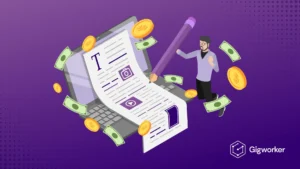Job interviews are part and parcel of any job search process, regardless of whether you’re looking for a full-time position, pitching for jobs as a freelancer, or hoping for a side hustle to earn some extra money.
No matter the role, there are still some common questions that potential clients or employers will want to know from job seekers.
And knowing how to answer common interview questions could help you land your next gig.
In this article, we’ll take a look at five of the most common interview questions for gig, freelance, and side hustle jobs, and help you form some sample answers to prepare for that next job interview.
1. Why Should We Hire You?
We’re starting with possibly one of the most common job interview questions.
Potential employers and clients want to know that they’re hiring the best candidate, and asking interviewees just why they should hire them is an easy way to determine who they should give the position to.
This is where your elevator pitch comes in.
(Don’t have one? As a freelancer, it’s really important you do because in the gig economy, you often only have a few seconds or paragraphs to sell your specific skill set and experience.)
Answering this question is similar to presenting a business proposal for a job — something that you’ll likely have to do as well if you’re a freelancer pitching for a job.
This isn’t simply an opportunity to talk about how you can do the work or your years of experience.
You want to be able to convince the hiring manager that their company will benefit more from giving you the job, compared to other candidates.
Read the job description or brief carefully and come up with examples of just how your particular skill set and experience can further enhance what they wish to achieve.
Talk about how you’ve helped achieve similar goals in your last job or even what you’re accomplishing in your current job.
Research existing problems they may have and offer cost-effective solutions.
2. Why Do You Want to Work Here?
This is usually the follow-up question to “Why should we hire you?”
Hiring managers ask this question largely to determine how much knowledge job seekers have about the company they’re applying to.
They want to find out how much you know about the company’s core values and mission statement, and whether you’ll fit into the company’s culture.
This question is possibly more important to answer as a freelancer because without the benefit of being a full-time employee, work culture and values can be more difficult to adopt and understand.
But while it’s likely you won’t join their permanent staff, employers still want to know that whatever you produce is in line with the kind of work environment they’re trying to create and the kind of brand they’re trying to build.
Make sure you research the company thoroughly.
Tell them what you like about it, why you feel they’re a great fit for you, and why the job aligns with your career goals (see below).
3. What Are Your Career Goals?

This question could be worded in several different ways: Where do you see yourself in five years?
Where do you see your career path leading?
What’s your dream job?
Potential employers ask this question mainly to gauge what kind of drive you have, which will in turn reflect not only on how ambitious but also how realistic you are.
Mostly, employers want to know if the job they’re offering will challenge you, help you grow, and keep you interested for a reasonable period of time.
There’s no need to lie if the job doesn’t specifically align with where you want to be professionally, especially if it’s obvious that you’re interviewing for a gig or a side hustle job.
There are still good reasons you can give as to why you’re interviewing for that particular job, such as the kind of experience you hope to gain from it and how that experience does align with your career goals.
4. What Is Your Greatest Weakness?
Ok, first things first.
You don’t have to bear your soul with this answer.
By that we mean, you don’t necessarily have to tell the hiring manager what your greatest (or worst, depending on how you look at it), most terrible Achilles’ heel is — the one that keeps you up at night.
You don’t want to send up red flags, but at the same time, you really should be honest.
How do you do that?
Talk about the weaknesses that you’ve identified and are working on. It’s probably better to focus on a skill weakness rather than a personality weakness — it’s often easier to improve a skill than to change your personality.
When talking about your skill weaknesses, make sure you’re not shooting yourself in the foot by identifying something that means you won’t be able to perform your job.
For example, if you’re interviewing for a freelance writing job, don’t say your greatest weakness is grammar or spelling.
Here are three examples of some common skill weaknesses and how you might be working on them (only if they’re true!).
Public Speaking
You can mention that you’ve joined your local Toastmasters club, where you’re getting more training on how to confidently deliver public presentations.
You could even say that it’s not something you prefer to do but are getting better at doing it with practice.
Numbers
This is a great one to use if you’re applying for a writing job, since you’re typically not expected to be good at math.
The reason why it’s worth mentioning is because you could talk about how you’re learning about interpreting analytics tools.
This is particularly useful for writing jobs related to websites, apps, and marketing, where analytics are crucial in determining strategy.
Job Delegation
Generally, you’d mention this weakness in the context of your inability to trust that someone else can do the job as well as you do, while still meeting the required deadlines.
Feel free to talk about this even if you’re applying for a management position that requires you to delegate jobs to others.
That’s because the solution for this is simple: utilizing project management software and tools.
What you’re telling the hiring manager is that you have an ability to take control of deadlines.
You’re also giving a clear example of how you’ve taken the initiative to ensure projects continue to run smoothly — they may even be interested to learn from you.
5. What Is Your Greatest Strength?

Yes, this is an opportunity to sell yourself, but make sure you don’t go overboard in trying to convince your potential employer or client that you’re the best thing to happen to them since sliced bread.
There’s a fine line between being persuasive and being arrogant.
When identifying your strengths, make sure you’re talking about something that’s actually relevant to the job.
Having excellent wildlife survival skills will not necessarily land you that freelance web developer job, but having creative problem-solving skills will.
Once again, be honest.
Don’t simply list strengths you think the interviewer wants to hear.
You want to be able to provide specific examples of how your strength benefited your previous job or projects, so listing a skill you actually have will make it far easier for you to convince them.
Preparing for Phone Interviews

This isn’t so much a common interview question as it is a common interview process for freelance or gig jobs since plenty of these are done remotely.
The questions asked during phone interviews are generally no different from the common questions listed above.
Without the benefit of eye contact or body language, however, there are some important things to keep in mind if you’re preparing for a phone interview.
Be Well Rested and, Well, Awake
Don’t schedule an interview for 15 minutes after you get out of bed in the morning simply because it’s convenient — especially if you’re not a morning person.
You want to sound alert and enthusiastic.
Have a glass of water within reach just in case you need it.
Also, remember to smile.
People can hear it in your voice.
Find a Quiet Spot and Don’t Get Too Comfortable
Sit (don’t lie down) in your study or work area at home, and make sure you and the interviewer won’t be distracted by anything that’s happening in the background.
Don’t forget to turn off call waiting.
Be Ok With Quiet Time
Downtime during a phone conversation may feel awkward, but interviewers understand that interviewees need time to collect their thoughts and prepare their answers during phone interviews as much as in real life.
So don’t panic if you need a few seconds to come up with an answer.
Write and Take Notes
The benefit of phone interviews is that they can’t see you.
So by all means, keep some message points near you to remind yourself what you want to say, and make notes of any questions you’d like to ask.
Be sure to ask questions that show you’ve been involved in the conversation (“It sounds like you’re planning to do XYZ, what are the steps to getting there?”), not those that you can easily find answers for online (“Does the company have branches in other states?”).
Interviewers don’t mind answering questions, but they’ll like it better if the questions are thoughtful.
Don’t get so engrossed in your notes that you forget to pay attention to what the interviewer is saying.
Email a Thank You Note After You’re Finished
You should do this for face-to-face interviews, but it’s even more important to write a thank-you email when it’s a phoner.
Your next step after putting down the phone should be crafting that thank-you note.
Remind them of your interest in the job, provide some further (relevant) information, and include links to your website, LinkedIn profile, or portfolio.
How to Answer Common Interview Questions for That New Opportunity
Being asked to attend a job interview is both an exciting and nerve-racking event, but if you’ve done your homework, you don’t need to panic.
Research is your greatest ally when it comes to answering common interview questions.
Don’t simply do research on the company you’re interviewing for — think about all your past experiences and jobs, and how your skills have helped previous companies.
Armed with some of the more common questions and answers that impress, you’ll do great at your next interview.








